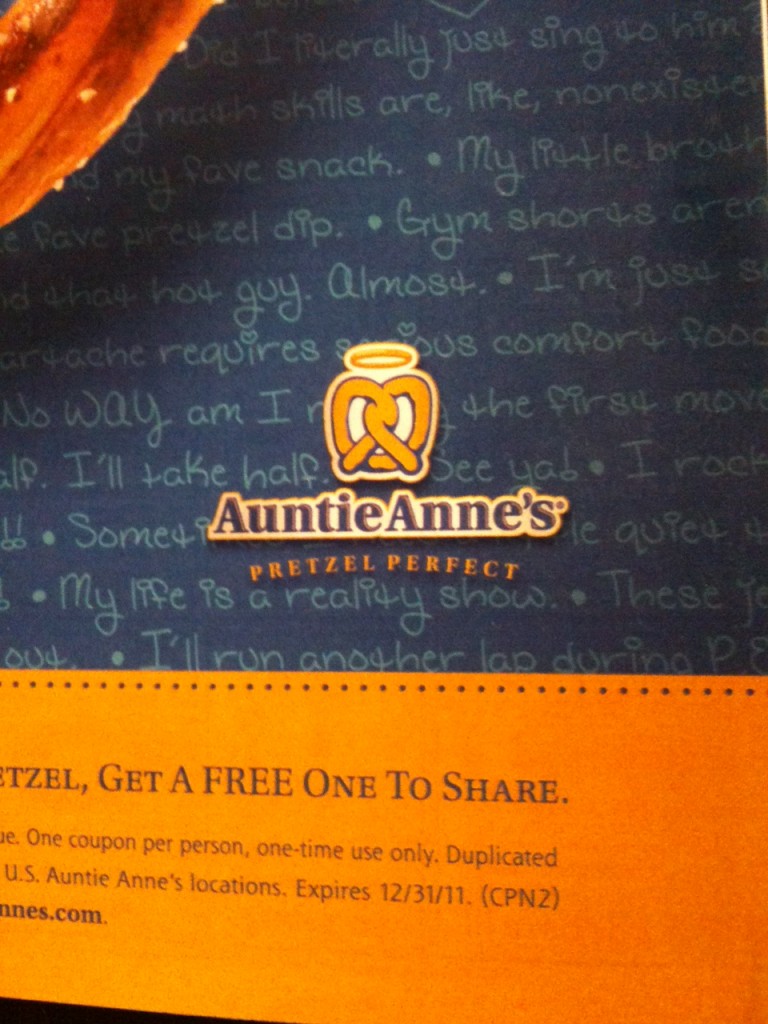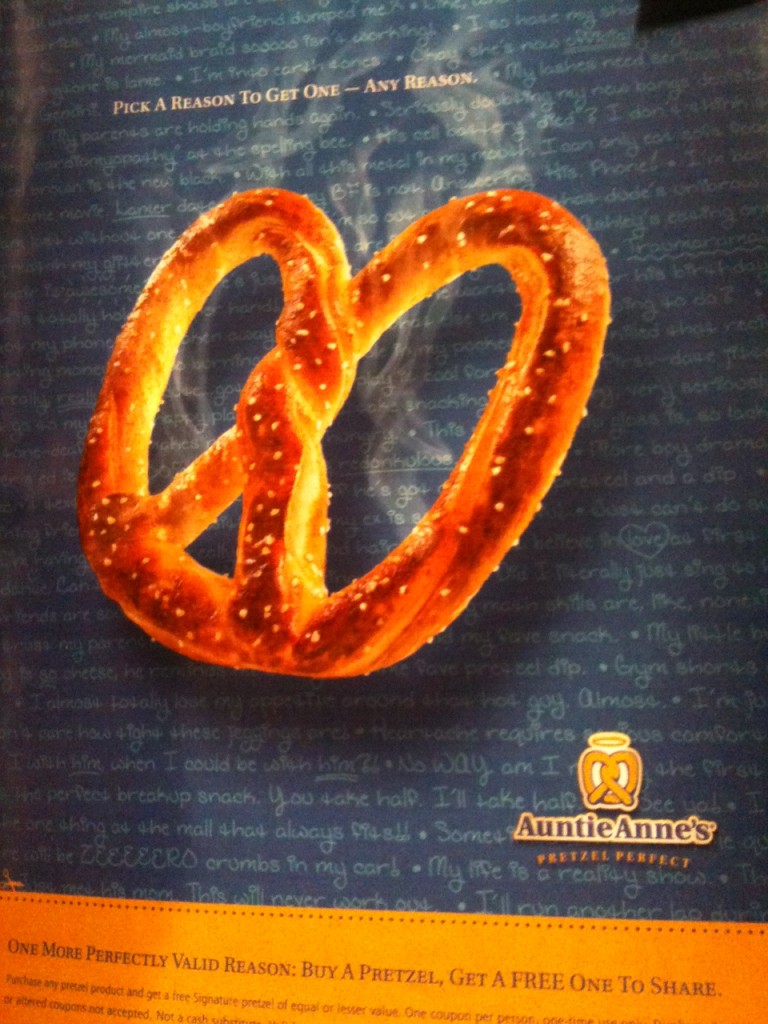
This fascinating three-and-a-half-minute excerpt from the BBC’s Horizon illustrates the McGurk Effect. What does your brain do when the information it is receiving from different senses doesn’t match? It’s solution is an example of just how much interpretive work our brain is doing all the time.
Alyssa M. sent in an ad that gives us a window into the advertising aimed at tween and teen girls. The ad, for Auntie Anne’s pretzels (an American chain that appears mostly in shopping malls) appeared in Seventeen magazine. The copy reads “Pick A Reason to Get One — Any Reason” and, in the background, is a long list of reasons.
The ad:
I’ll let Alyssa take it from here:
..the reasons in the background reflect gendered expectations that are placed on [teen girls]. One of the reasons, for example, is “I’ll run another lap during P.E.” This reflects the idea that women should feel guilty about eating food, and that they should make up for eating a salty pretzel by exercising more. It also illustrates that women must justify eating by promising themselves that they will prevent any weight gain, which would stray from the type of woman that society deems best (the thin woman). Another reason provided is that “It’s the one thing at the mall that always fits!!” This again reflects the social necessity for women to be thin, as it implies that women are concerned with the fact that clothes at the mall are often too small, which implies that the women are too large. This ad very much focuses on girls’ size and waistlines and illustrates that a thin girl is the best girl, and that to be accepted by society, teen girls must act in accordance with this expectation.
Another theme seen throughout the ad is that food can be consumed in order to ease the emotional pain of a traumatic event such as a breakup. For example, two other reasons given are that “My almost-boyfriend dumped me” and “It’s the perfect breakup snack.” Both suggest that a breakup warrants an unhealthy indulgence like a pretzel, but this also implies that unhealthy foods like this are only acceptable during a bad experience like a breakup. Eating is okay when you need it to comfort yourself, but if you are not going through such an experience, then you need to watch your weight and “run another lap during P.E.” Those who break this rule are at risk of being policed by others and losing the body type that society appreciates most. This ad therefore supports the expectation placed on teen girls to be thin and concerned with their weights.
Close ups:



Alyssa’s analysis reminds me of Jamal Fahim’s argument for how chocolatiers convince women to indulge in their product.
In the late 1800s, one suffering from impotence, addiction to morphine, or belly aches might be prescribed John Pemberton’s French Wine of Coca. The wine concoction contained caffeine and 8 1/2 milligrams of cocaine (equivalent to snorting about 1/2 line).
 (source)
(source)
 (source)
(source)
Prohibition’s arrival in Atlanta in 1886 led Pemberton to re-write his recipe to exclude the alcohol. Pemberton advertised it as the “great national temperance beverage.” In 1903, when cocaine was outlawed, Pemberton had to rework his recipe again. Coca Cola, as we know it, was born.
See The Digital Deli Online for more.
Lisa Wade, PhD is an Associate Professor at Tulane University. She is the author of American Hookup, a book about college sexual culture; a textbook about gender; and a forthcoming introductory text: Terrible Magnificent Sociology. You can follow her on Twitter and Instagram.
Delia B. sent along this 80s-riffic, apocalyptic music video featuring Gossip Girl’s Taylor Momsen singing Make Me Wanna Die. Momsen is a 17-year-old teen idol who strips naked over the course of the video. Her naked body is eventually obscured, but not before we get a good look at her in her bra and underwear.
On the one hand, because Momsen is 17, one could argue that this video is encouraging the sexualization of underage girls and child pornography (which involves, by definition, children under age 18).
On the other hand, this video is, relatively speaking, pretty sexually tame. I imagine that most Americans would not think that this would incite pedophiles and that many would argue that she’s perfectly old enough, given that she’s an actress/rock star, to be stripping down to her undies. Not to mention the fact that the average age of virginity loss in the U.S. is about 16.
The video is a great opportunity, then, to have a discussion about the social construction of age. To start: What age is “too young” and what age “old enough”? What’s the difference between 17 and 18? Is the difference equally meaningful for everyone? Should we codify such meanings into law? And do today’s laws reflect our contemporary culture mores? According to who?
Lisa Wade, PhD is an Associate Professor at Tulane University. She is the author of American Hookup, a book about college sexual culture; a textbook about gender; and a forthcoming introductory text: Terrible Magnificent Sociology. You can follow her on Twitter and Instagram.Jordan B. sent in an interesting observation about the current advertising at Diesel. Many of the ads feature varying skin tones, but the darker-skinned models appear to always be male, while the women appear to always be lighter-skinned. Two ads:

Jordan thinks that Diesel is following American cultural rules that gender race and racialize gender. For example, if I may quote myself:
According to American cultural stereotypes, black people, both men and women, are more masculine than white people. Black men are seen as, somehow, more masculine than white men: they are, stereotypically, more aggressive, more violent, larger, more sexual, and more athletic. Black women, too, as seen as more masculine than white women: they are louder, bossier, more opinionated and, like men, more sexual and more athletic.
I’ll let Jordan finish the thought:
This is why Diesel’s selection of a black man and light skinned women makes sense for their ads. By choosing a black man, men everywhere will want to identify with the hyper-masculinity our society has attributed to them. Similarly, by choosing a light-skinned woman, Diesel is selecting the type of women our society has put on a pedestal.
For more, see our posts on asymmetry in interracial marriage, how Asian women are marketed to white men, and data on race and response rates on a dating website.
Lisa Wade, PhD is an Associate Professor at Tulane University. She is the author of American Hookup, a book about college sexual culture; a textbook about gender; and a forthcoming introductory text: Terrible Magnificent Sociology. You can follow her on Twitter and Instagram.
In the 2-and-a-half-minute video below, sent in by Lisa G., a decorated concert violinist named Joshua Bell plays in a Metro station at L’Enfant Plaza in Washington D.C. for 45 minutes. Over 1,000 people walk by without turning their heads, 27 give money, and 7 people stop to listen for a minute or more (source). Lisa G. summarizes:
Bell recalls that an awkward moment ensued every time he was done with a song because no one applauded or even acknowledged his existence because to these passengers he was just another street performer begging him for a dollar.
What makes Joshua Bell worth listening to? The experiment points to the importance of context. How do we know that we are listening to a master musician? One important clue is where they are playing, and how expensive it is to have the opportunity to listen. In a concert hall full of seats paid for with large bills, Bell’s talent is authenticated by the arbiters of taste who are the gatekeepers of the venue. Concert-goers do not necessarily know whether or why Bell is any good. They rely on the arbiters to determine who is worth listening to. And listening to who it is that is worth listening to provides them with expensive, and therefore scarce, cultural cred. They have seen Bell in concert (“oh and it was glorious!”); have you?
But in the Metro, Bell is no one. The context of the Metro fails to authenticate Bell’s music. Everyone can listen, thus hearing offers no distinction at all. And almost no one cares.
Lisa Wade, PhD is an Associate Professor at Tulane University. She is the author of American Hookup, a book about college sexual culture; a textbook about gender; and a forthcoming introductory text: Terrible Magnificent Sociology. You can follow her on Twitter and Instagram.
In Deadly Persuasion, Jean Kilbourne discusses the tactics of car advertisers. Cars, she argues, are offered as keys to happiness. Often they are anthromorphized, even positioned as a lover or a soul mate.
In this commercial, sent in by Jennifer G., we see just this sort of advertising. The car is described with the words “luxury,” “fire,” “bold,” and “daring.” It is, indeed, “…capable of moving your soul…”
The idea that we are moved by this advertising might seem patently ridiculous. Phil Patton of the New York Times, however, reports the findings of a Mercedes/Roper survey:
Lisa Wade, PhD is an Associate Professor at Tulane University. She is the author of American Hookup, a book about college sexual culture; a textbook about gender; and a forthcoming introductory text: Terrible Magnificent Sociology. You can follow her on Twitter and Instagram.…36 percent of Americans said they loved their car and 23 percent considered their car their best friend. The poll found that 12 percent of respondents said their car understood them better than their significant other.
Chloe L. sent along an analysis of a post-Thanksgiving advertisement she received in the mail:
The ad, Chloe points out, manages to cover quite a bit of ground. The tag line at the very top (“Keep feeding yourself with shoes, not food!”) tells women to forgo eating in favor of figurative consumption. This resonates with the cultural expectation that women’s primary purpose is to be, as Chloe puts it, “aesthetically pleasing for others.” She is also presented as a sexualized object. Chloe again:
Though we cannot see more than legs, we know that it is a woman by her feminine high-heeled booties and shaved legs… [she] is presumably naked with her bra hanging on the door knob.
The image, then, harmonizes nicely with the copy; both suggest that women should make strong efforts to shape and display their bodies in ways that conform to cultural expectations.
Lisa Wade, PhD is an Associate Professor at Tulane University. She is the author of American Hookup, a book about college sexual culture; a textbook about gender; and a forthcoming introductory text: Terrible Magnificent Sociology. You can follow her on Twitter and Instagram.


